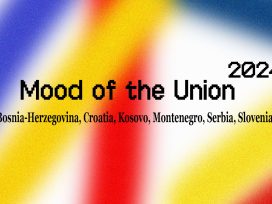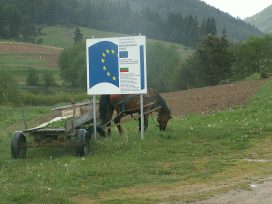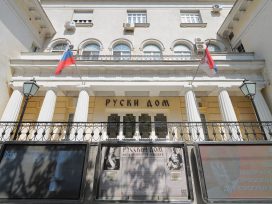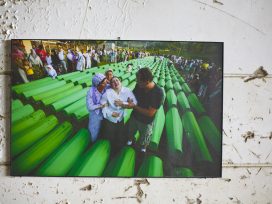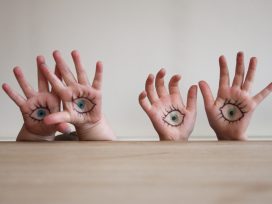The visit of the Serbian president Boris Tadic to Vukovar in October 2010, where he was met by the Croatian president Ivo Josipovic, attracted the attention of the world media. It was, after all, the first time that a Serbian president had expressed profound regret at the destruction of the Croatian town by the JNA (Yugoslav National Army) and Serbian paramilitary in the autumn of 1991. By apologising at the Ovcara mass grave, Tadic showed his willingness to deal responsibly with the past – a remarkable gesture for a Balkan politician.
Josipovic – who in the first year of his presidency has visited more mass graves and apologised more than anybody else – then visited the village of Paulin Dvor, where the Croatian paramilitaries killed eighteen imprisoned Serbian civilians and one Hungarian in December 1991. It really did look impressive: two heads of state demonstrating good intentions, symbolically closing the vicious cycle of war. A few days later, the Bosnian tripartite presidency joined in by calling for reconciliation. The new member of the presidency, Bakir Izetbegovic, said he apologised “for every innocent person killed by the BH army”.
This recent frenzy of activity at the top garnered much praise, as much from the “international community” (Brussels, Washington) as from ordinary citizens in all countries in the region. Yet not all reactions to the moves to end animosities were positive: some considered it to be a show put on for the benefit of the world public. Almost all commentators pointed out, however, that while words and symbolic gestures are a good start, some big questions remain open: Where are the lists of disappeared war prisoners? When will the main war-criminal at large, Ratko Mladic, be extradited? When will looted cultural property be returned to Croatia? When will refugees return to Krajina?
It is hard to believe politicians in the Balkans, even when they seem to be acting with the best intentions. But in order to move on one must start to believe them; one must begin to take their words seriously and assume that their gestures indicate a serious intention to change perceptions and attitudes towards each other’s nations and towards the past. Tadic and Josipovic clearly demonstrated their political will to proceed towards reconciliation. Public apology is the first step on that path and they managed to do it modestly and gracefully, although they were not the first. The former Croatian president Stjepan Mesic apologised in Belgrade in 2003, and nor are the Montenegrins lagging behind. In March, the Serbian parliament passed a “Declaration on Srebrenica”. Although it stopped short of using the word genocide, it is a very important document that finally acknowledges the responsibility of the Serbian army in the massacre of 8000 Bosniaks in July 1995.
Ever since the war in Bosnia ended in 1995, there has been much talk about reconciliation – first and foremost from abroad. There has also been a lot of foreign money spent on various experts, almost as if reconciliation were a branch of rocket science, rather than, as it is defined in the dictionary, a “settlement, understanding, squaring off, compromise” between neighbours. The conclusion arrived at by the endless rounds of international brainstorming boils down to the need for collaboration, with recommendations for different ways to do that. As if the neighbouring citizens of Croatia, Serbia, Bosnia and Kosovo needed to be told. They only have to look at the criminals who on all sides cheerfully pursue collaborations dating back to the war: from the smuggling and exchange of petrol, weapons, people and tobacco to criminal favours such as assassinations. Bizinismen big and small, of all nationalities and kinds, also collaborate – be it overtly or covertly.
The Slovenes were the first to start selling their products to Serbia, capitalism beating patriotism one to nil. Others were perhaps not so open in their dealings, operating more or less under the radar. Yet when Tim Judah, a journalist for The Economist who knows the region very well, published an article about the Yugosphere in 2009, he summoned an almighty storm of protest, especially in Croatia. He wrote precisely about the collaboration practiced at all levels, proving that the former Yugoslavia functions as a single space. Despite the nationalist ideology that condemns such collaboration as “anti-patriotic”, people do work together. Times are hard, writes Judah, and it is natural that people try to exploit the advantages of a common language and the fact that consumers are used to having certain products. In the last few months alone, writes Judah, numerous new initiatives have been announced: the funding of a railway company jointly owned by Slovenia, Croatia and Serbia; a meeting between the national lottery companies of Macedonia, Montenegro, Slovenia, Kosovo, Serbia, Bosnia and Herzegovina and Croatia, with a view to merging; the signing of an agreement about the extradition of criminals between Croatia and Serbia and between Bosnia and Croatia, together with a commitment to more police cooperation in the region; another agreement on military cooperation between Serbia and Croatia… and much else besides.
It was interesting to note, in the polemics prompted by the article, that it was not so much cooperation itself that caused offence as the very term “Yugosphere”. Yet not even Croatian nationalism (which also reviles Slovenia for blocking Croatia’s entry to the EU) could deter Croatian businessman Emil Tedeschi from extending his market to Slovenia, Bosnia, Montenegro, Macedonia and Serbia. Tedeschi prefers the term “south eastern Europe”. Others prefer “western Balkans” – anything but the prefix Yugo! But the language is important and this incident reveals the strong predominance of nationalist sentiments and values, regardless of how collaboration works in reality.
The main difference between efforts at reconciliation over the past fifteen years and now is that previously there has been no visible political will. The new impulse has come with a new generation of politicians who seem determined to lead their countries into the EU. Having long been a pariah, Serbia has recently managed to join the RCC (Regional Cooperation Council, formerly the Stability Pact), to become a signatory of the CEFTA (Central European Free Trade Agreement) and PFP (Partnership for Peace), to negotiate the abolition of visas for the EU, and is moving ever closer to the EU. Although one can’t say that the EU is expressing enthusiasm for Serbian accession, there is an awareness that stability in the region depends on there being a perspective for all the countries in it to become Union members one day, no matter how far off.
If business people collaborate, if Croatian publishers take part in book fairs in Belgrade, if national football teams play each other and if ordinary people visit their relatives across the border without being suspected of treason any longer, is there even a need for an official policy of reconciliation? Or should it be left to spontaneous, bottom-up initiatives, as a few prominent commentators have suggested?
Despite the arguments for reconciliation in Judah’s text, as well as the latest political manifestations of a change of attitude, it is still possible in the Croatian press to accuse Tim Judah of “Yugo-nostalgia”, to call somebody a traitor because he sold his factory to a Serb, to object to a hotel or a shipyard being bought with Serbian capital. The majority of the citizens of Serbia, Croatia or Bosnia and Herzegovina are far from being reconciled with the idea that their neighbours are no longer their enemies. Is it not reasonable to believe that, were citizens left to their own devices, reconciliation would take at least another few more generations? Assuming they are looking towards a common future in the EU, on the other hand, one might say that the sooner they reconcile, the better. However, there exists no systematic programme of reconciliation to follow up on the symbolic gestures of politicians. That is not to say that Tadic and Josipovic are not sincere in their repentance and in their desire to influence their societies with such gestures. They are. But if no programme of reconciliation is prepared and promoted at the governmental and institutional levels, then their gestures, however noble, are condemned to remain mere shows of goodwill, rather than, as is intended, signs of substantial change. In short, they are placed at the mercy of… spontaneity.
Spontaneity? Well, neither war nor peace happens spontaneously. Both are constructed; both, in a manner of speaking, descend upon people. Wars are the result of political will, prepared by inflammatory rhetoric that constructs the “enemy” and justifies aggression. Whether a war is just or not – that is another matter. The same goes for the peace and reconciliation process. It needs to be initiated and conducted from the top, spreading downwards in exactly opposite direction, actively promoting tolerance and collaboration. If reconciliation between France and Germany, for example, had been left to citizens, a united Europe would still be a hundred years off.
Reconciliation not only has political and economic aspects. Even more important is social reconciliation, because it has to do with the emotions, and emotions are easy to inflame and therefore dangerous. After all, without whipping up nationalist emotions, purposefully and with the political will to do so, it would not be possible to start wars. It is only logical, then, that addressing people’s emotions is equally important for the way out of nationalism.
The first, “easy” step towards reconciliation is visible political determination. Not only an act of declarative apology, but an apology followed up by programmes affirming new values and encompassing all spheres and levels of society, from governmental institutions to everyday life. It does not mean that one step has to be completed in order to embark on the next one. It is a set of different but parallel activities undertaken by institutions and individuals, some with short-term and some with long-term effects.
The precondition for the reconciliation process is justice; indeed justice is the very fundament upon which reconciliation rests. But there is no justice without truth. Without a legal system for trying one’s own war criminals – and thereby uncovering facts about crimes committed in recent wars – everything else, every other attempt is bound to fail. This is not a simple task. In Croatia, the real obstacle is the absurd conviction, nursed for nearly two decades, that the Croatian army cannot be guilty of war crimes because it was defending the nation. This has had a very important consequence: that war criminals are regarded as war heroes. For that reason, the ICTY (International Criminal Tribunal for the former Yugoslavia) is perceived as an enemy institution – and not one founded and designated to distribute justice (albeit, symbolic), to uncover facts about the wars and thereby contribute to historical truth. Until the Declaration on Srebrenica, Serbia lived in denial, both at the public and the political levels, of any participation in the wars. Reconciliation in Bosnia and Herzegovina, meanwhile, is complicated through its special status as a divided country. Not only administratively, but psychologically and emotionally: victims and perpetrators live in the same state, the same towns, maybe even the same streets and villages.
Promoting different values means constructing a different psychological framework. It is no longer necessary to persuade citizens to collaborate across state borders: they are doing that already. What is needed now is to send out the message that collaboration – visiting, trading, working together, having positive perceptions of Serbs or Croats or Bosniaks – is not only “politically correct” but also welcome; that a writer will not be crucified in the media because of a book they publish in Serbia or a singer for putting on a concert – which, of course, was the case until very recently. But how does a government send out such a message? Indirectly, by supporting common initiatives, from regional agreements like CEFTA, RCC or PFP on smaller scale collaborations like singing competitions or school exchanges between Serbia and Croatia. However even this is not enough: much more direct and visible effort is needed in order to foster reconciliation.
Needless to say, the most efficient means are the mass media. Television is the only way to reach a mass audience today. Every politician knows that the media are the key to success. From there, values seep into everyday life, not vice versa. If the government were to start systematically promoting anti-nationalist values, public TV channels would follow. Not that it would work automatically or even easily – for that the atmosphere that currently exists within the tightly-knit party-media-capital conglomerate would need to change considerably. However it is by no means inconceivable that public TV might accept that the “fashion” of the day is reconciliation, not nationalism and hate-speech. Private channels, less prone to propagating nationalism anyway and with an eye to profits, would follow the tide. Advertising is by no means neutral in small countries like these, because big foreign companies want to be on good terms with their governments.
Sending out positive signals about neighbours is a lot, but it is still a short-term policy. Another kind of government, another kind of dominant political will, could swing public opinion around towards nationalism again – which is precisely what happened in the Nineties. In order to really establish different values and encourage reconciliation, there needs to be a push for a long-term institutional approach, with education in history being the most important aspect of this. (Or should this be left to spontaneity as well?) If the process begins by trying war criminals, it needs to continue with historical research and the publication of history books and textbooks. Education in history must be based on fact, not myth and ideology.
Reading today’s history books and textbooks, one receives very contradictory information. For example, 65 years after the end of the WWII, the Croats are still struggling with the sad fact that the only time in history when Croatia was ever independent was when it also happened to be a fascist puppet state (NDH – Independent State of Croatia). Indeed, the first president of the newly established state of Croatia, Franjo Tudjman, insisted that the state was built on the foundations of the old one. The Croatian constitution, however, says just the opposite: that the new state is founded on anti-fascism – showing that Croatian society is still divided over its past.
In all post-Yu societies, people are used to living with such contradictions: during communism, their memory was usually at odds with history. In a land ruled by communist ideology, folklore, myth, remembrance and lack of established facts, it was easier to produce propaganda. After 1945, it was declared that 700,000 civilians perished in the Jasenovac concentration camp in the NDH, only to end up at a realistic 60,000 some four decades later. As for the tens of thousands of NDH soldiers and civilians executed in Bleiburg just after the war ended, the precise number is still disputed. It was unimaginable that Tito’s glorious army, defending the country from enemies, could have committed war crimes in 1945. Generations of Yugoslavians grew up not questioning the “truths” contained in textbooks, while listening to very different stories at home. It was easier not to challenge the dogma.
So far, there has been too little history and too much memory; this is one reason why it was fairly easy to start the wars in the Nineties. In any case, history books as well as textbooks are both a part of the problem and the solution. Historians should, for once, stop behaving as servants of the current ideology and start presenting facts.
The educational process works slowly. However education in the spirit of reconciliation is about much more than correcting the textbooks. For reconciliation, society needs a consensus. In order to articulate truth and to facilitate acceptance of it, there needs to be a public arena. Facts need to be accepted. A grown-up, responsible society aiming at reconciliation can do that, as Germany did. This takes time, but it can be helped by cultural projects: culture can act as a public arena for such debate.
The question is: how can arts and culture can foster reconciliation, while mainstream culture and its institutions – for example the Serbian and Croatian Academies of Science – promotes nationalism? Like mass media, culture serves as a vehicle for nationalist propaganda before and during wars. It is impossible to discuss the reconciliatory role of culture and arts as if they were independent from the political will.
Our expectations from culture tend to be too high; we hope that culture will help us create a better, more peaceful and more just society. Underlying this idea about the role of culture in the process of reconciliation is the belief that artists and intellectuals, and learned people in general, are beings of a higher moral order: because of their high education, they should know better. However, this is not so. Over and over, history has proven that culture can be efficient in producing propaganda, especially in totalitarian regimes. Why? Because the morals of cultural bureaucrats and artists are no different to those of anybody else. Moreover, in the former Yugoslavia (but also elsewhere), there was a tradition of cultural servility to the regime – there was hardly any other type of culture to speak of. Indeed, there was no other way to survive: self-preservation forced artists and intellectuals to become state employees. No wonder they were people who disseminated nationalism in the Eighties. Writers, academics, journalists, members of cultural institutions: all cultured people who became cogs in the nationalist propaganda machines. Their task was to create Others in society, to prepare people for armed conflict, for war. They did their job very well.
An emblematic picture to remember from 1993: Radovan Karadzic – a poet, psychiatrist and the president of Republika Srpska – standing in the hills above Sarajevo. With him, the Russian poet Edward Limonov, shooting a machinegun in the direction of the city.
When relying on the positive role of culture in reconciliation, we should keep in mind its capacity to produce ideology and propaganda, to manipulate people, to prepare and justify murder. Probably, the opposite is also true – if culture can turn into a nationalist propaganda machine, then, in a democracy, it can also enable the free circulation of ideas, which is the key to a long-term reconciliation. In order to achieve that, projects supported by the state need to be free from political abuse. Compared to other activities, armament for example, culture comes cheap and can achieve a lot. It usually gets only the fraction of a budget; perhaps it would be worth spending a bit more.
Reconciliation is happening in different fields of life, sometimes more quickly, sometimes less. Programmatic actions, especially in the field of media, education and culture, can only be beneficial. Changes are already visible. No wonder: almost two decades have passed since the beginning of wars and a whole new generation has grown up. But if this new generation is the one to watch in order to measure the improvements and the speed of social reconciliation, then the news is not good. In a recent opinion poll (by the Croatian non-governmental organisation GONG) among high-school students between 17 and 18 years old, only 27% think that the NDH was a fascist state, more than 40% think that Croats in Croatia should have more rights than citizens belonging to a minority, 40% are against prosecuting Croat soldiers for war crimes, 40% believe that homosexuality is an illness, and 49.2% oppose Croatian entry to the EU. The opinion poll is surely not representative of all Croatian youngsters, but it confirms that nationalist values are still influential. Yet while this miniature portrait of the new generation gives little reason for hope, it does provide strong motivation for a politically willing government to act promptly if reconciliation is to be accomplished this century.
Ultimately, one cannot but notice a kind of paradox at work in the territory of the former Yugoslavia. First came independence and the dismemberment of Yugoslavia through bloody wars. Tens of thousands of lives were lost: a conservative estimate for Bosnia alone is some 100,000 dead. Hundreds of thousands people were displaced or resettled, not to mention those maimed and orphaned. Between 30,000 and 50,000 women, mostly Bosniak, were raped. Now, a mere decade since this tragedy, all the newly established independent states want to join the EU and live in union with neighbours whom, historically speaking, they were killing only yesterday.
Why fight for independence? Why wars? Was it a civil war? Was there only one aggressor? How many victims and on which side? Answers to these questions are hard to obtain, finding acceptance for them in any society even harder. But in order to succeed, reconciliation programmes must deal with them at all levels, and for that the political will must exist. Again, reconciliation does not come easy and it takes time, but it might take less time and be easier if there is real will and dedication, from the top down. Then reconciliation might start working faster the other way around as well.
At least, one would like to imagine that such an approach is worth trying, given the failure of the last 15 years of laissez-faire to yield much.
